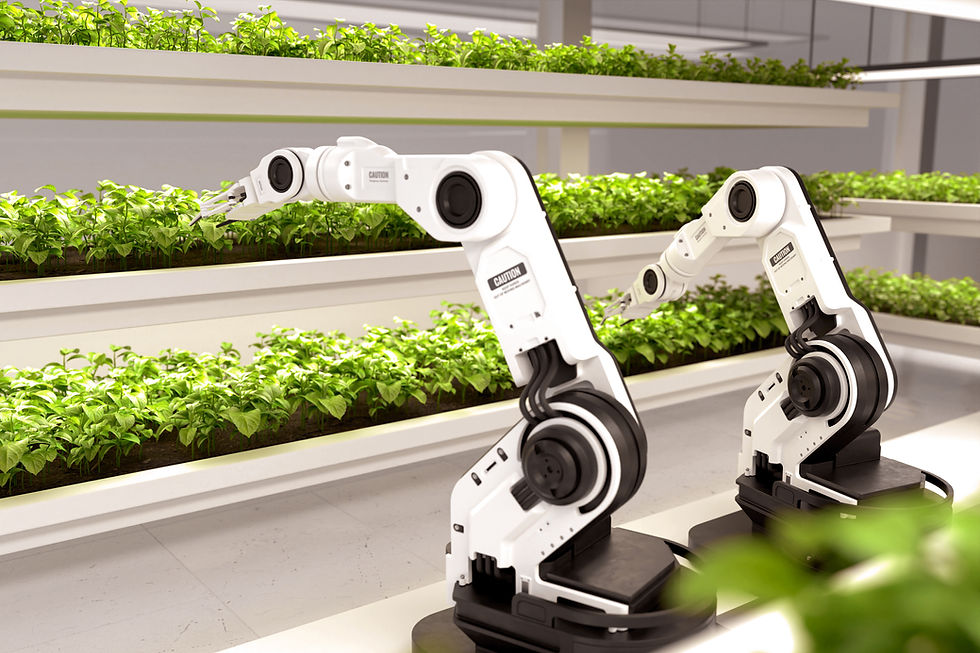The Role of AI in Driving Sustainable Digital Transformation
- TinkerBlue Newsroom
- Aug 14, 2024
- 4 min read
In an era where sustainability is not just a buzzword but a crucial business imperative, organizations worldwide are grappling with how to balance technological advancement with environmental responsibility. Artificial Intelligence (AI) is emerging as a powerful tool in this quest, offering innovative solutions that drive digital transformation while fostering sustainability. However, as AI continues to evolve, businesses must also adapt to harness its full potential effectively.

The Intersection of AI and Sustainability
The synergy between AI and sustainability is becoming increasingly evident. AI’s ability to analyze vast amounts of data, predict outcomes, and optimize processes makes it a natural ally in efforts to reduce carbon footprints, conserve resources, and enhance energy efficiency. For instance, in manufacturing, AI-driven predictive maintenance can reduce energy consumption by optimizing machinery use. In agriculture, AI-powered precision farming techniques allow for more efficient use of water and fertilizers, significantly reducing environmental impact.
The energy sector, too, is witnessing AI’s transformative effects. Smart grids powered by AI can predict energy demand more accurately, integrate renewable energy sources more efficiently, and reduce wastage. By enabling real-time decision-making, AI is not only helping businesses become more sustainable but also ensuring that they can do so while maintaining or even enhancing productivity.
AI-Driven Innovations for a Greener Future
AI-driven innovations are paving the way for a more sustainable future across various industries. Predictive analytics, for example, allows businesses to anticipate demand, reduce overproduction, and minimize waste. Automation powered by AI can streamline operations, reducing resource usage and operational costs. In logistics, AI can optimize routes, leading to significant reductions in fuel consumption and emissions.
Smart cities are another area where AI is making a significant impact. AI-powered traffic management systems can reduce congestion, lower emissions, and improve air quality. Waste management systems that use AI can sort and process waste more efficiently, leading to higher recycling rates and reduced landfill use.
The Need for Businesses to Adapt
As AI continues to advance, the pressure on businesses to adapt is mounting. To fully leverage AI for sustainable digital transformation, organizations must evolve their strategies, processes, and mindsets. This requires a commitment to continuous learning and development, ensuring that both leadership and employees are equipped with the skills needed to work alongside AI technologies.
Adapting to AI involves more than just adopting new tools; it requires a cultural shift towards innovation and agility. Businesses that embrace this shift will be better positioned to harness AI’s potential, driving both sustainability and profitability. Conversely, those that resist change risk falling behind in a rapidly transforming market.
Agathe Daae-Qvale emphasizes the importance of adaptability in this context. "In today’s fast-paced digital landscape, businesses must be willing to evolve continuously. AI offers incredible opportunities, but to seize them, organizations need to foster a culture of innovation and resilience," she says. By integrating AI into their operations while maintaining a human-centric approach, businesses can achieve sustainable growth that benefits both the planet and their bottom line.
Balancing Technological Advancement with Environmental Responsibility
While AI offers tremendous potential, it is crucial to approach its implementation with a balanced perspective. Technological advancement should not come at the expense of ethical considerations or environmental responsibility. AI-driven solutions must be designed and deployed in ways that prioritize sustainability and respect for human values.
Agathe Daae-Qvale advocates for a holistic approach that integrates AI with human-centric decision-making. "AI is a powerful tool, but it is only as effective as the people who use it. Businesses must ensure that their AI strategies align with their sustainability objectives and are guided by ethical considerations," she advises. By striking this balance, organizations can leverage AI to drive meaningful change that is both innovative and responsible.
Challenges and Considerations
Despite its potential, the adoption of AI in sustainability efforts is not without challenges. Data privacy concerns, the need for skilled professionals, and the energy consumption associated with AI technologies are all significant considerations. Additionally, there is the risk that AI-driven technologies could inadvertently increase energy use, counteracting their intended benefits.
To overcome these challenges, businesses must invest in developing AI solutions that are not only effective but also energy-efficient and ethically sound. Collaboration between industry leaders, policymakers, and technology experts will be key in creating standards and practices that ensure AI contributes positively to sustainability goals.
Conclusion
AI is undeniably a driving force in the quest for sustainable digital transformation. Its ability to optimize processes, reduce waste, and support data-driven decision-making positions it as a crucial tool for businesses aiming to achieve both environmental and economic success. However, to fully realize AI’s potential, businesses must adapt, innovate, and embrace a culture of continuous learning and ethical responsibility.
By integrating AI with human-centric approaches and aligning technological advancements with sustainability objectives, organizations can navigate the complexities of digital transformation in a way that benefits both the planet and their long-term success. As Agathe Daae-Qvale aptly puts it, "The future belongs to those who are willing to evolve and innovate. By harnessing AI responsibly, we can create a world where technology and sustainability go hand in hand."
Amazon.com: Digitized Product Management: A Guide to Reinventing Your Business Through Digitalization eBook : Daae-Qvale, Agathe: Kindle Store



Comments